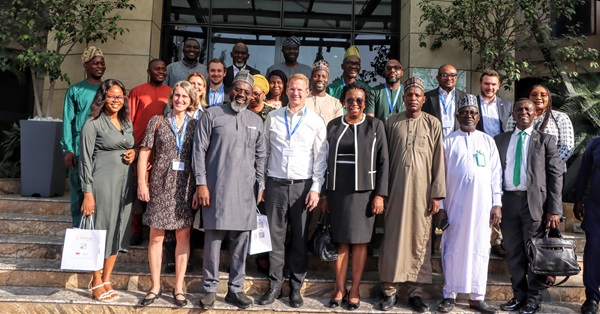
The United Nations Industrial Development Organization (UNIDO) is actively seeking collaboration with the National Agency for Science and Engineering Infrastructure (NASENI) to address energy poverty in Nigeria through the adoption of renewable energy solutions and to accelerate the nation’s industrial development.
This collaborative effort, discussed during a meeting on Monday, October 11, 2023, in Abuja, aims to localise renewable energy solutions and propel the industrialisation agenda of Nigeria.
The delegation, led by the deputy head of the UNIDO Nigeria Office, Mr. Adekunle Olusile said some of the key objectives of this collaboration included the facilitation of partnerships between German companies, research institutions and NASENI. These partnerships, he said, would focus on reducing energy waste, supporting the government’s food production agenda and advancing technological advancements in the country.
Representing the executive vice-chairman and CEO of NASENI, Mr. Khalil Suleiman Halilu, the agency’s coordinating director of planning and business development,Nonyem Onyechi expressed appreciation for UNIDO’s outreach to NASENI. She highlighted NASENI’s role in driving Nigeria’s industrial development through technology transfer and the production of capital goods, particularly for small and medium enterprises (SMEs) and entrepreneurs.
During the meeting, the deputy director of engineering infrastructure,Engr. Emmanuel Ajani provided a detailed overview of NASENI’s interventions, programmes and projects in the renewable, agricultural and industrial sectors. The presentation showcased various technological innovations, products and machineries produced by NASENI, underlining the agency’s commitment to fostering industrial growth.
The team lead of the UNIDO Investment and Technology Promotion Office (ITPO) Germany,Michael Schmidt explained that UNIDO’s focus is on mobilising investments and technologies for sustainable industrial development. He emphasised the organisation’s support for investors and companies by facilitating technology transfer from Germany to developing countries.
The delegation from UNIDO expressed specific interest in supporting Nigeria’s food production agenda through food processing and packaging. They also emphasised the importance of reducing energy waste through biogas production and implementing renewable energy solutions such as solar PV and solar batteries.
Highlighting Germany’s strength in the renewable sector, Schmidt noted that several German companies are eager to explore partnerships that align with Nigeria’s plan to increase its solar PV usage before 2030.
To advance these collaborative initiatives, NASENI and UNIDO established a working group or committee to play a crucial role in driving the proposed projects forward and engaging potential partners. The meeting, held at Belanova Apartment and Suites in Abuja, featured representatives from prominent German companies, including Bloomhill Agroservices, (B)energy, Wilo Pumps, GEA, EMPO-NI and University Weihenstephan Triesdorf.
The partnership between UNIDO and NASENI marks a significant step toward achieving sustainable industrial development in Nigeria, promoting renewable energy solutions and fostering economic growth. This collaboration aligns with the global agenda for climate action and technological advancement.


